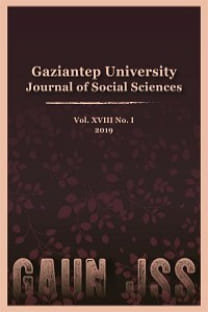Martin McDonagh’ın Hangmen Oyununun Politik Bağlamsallığı: İngiltere’de İdam Cezası Tartışmalarına Bir Müdahale
Martin McDonagh, Hangmen, bağlamsal, idam cezası, ölüm cezası
Political Contextuality of Martin McDonagh’s Hangmen: An Intervention in the Debate over Capital Punishment in Britain
Martin McDonagh, Hangmen, relational, contextual, capital punishment,
___
- Campbell, D. (2015). A hanging offence. London: Wyndham's Theatre.
- Canseco, M. (2011). Death penalty: Most Britons support reinstating the death penalty for murder. Angus Reid Public Opinion. Retrieved from web.archive.org/web/20120819163903/http:/www.angus-reid.com/wp-content/uploads/2011/08/2011.08.23_Death_BRI.pdf
- Capital Punishment Bill 2013-14. (2013). Retrieved from services.parliament.uk/bills/2013-14/capitalpunishment.html
- Clark, R. (1995a). English hangmen 1850 to 1964. Retrieved from http://www.capitalpunishmentuk.org/hangmen.html
- Clark, R. (1995b). James Francis Hanratty: The A6 murder. Retrieved from http://www.capitalpunishmentuk.org/hanratty.html
- Cunliffe, H. & Gwilliam, J. (2006, Apr. 6). Harry had the regulars hanging on his every word. Manchester Evening News. Retrieved from www.manchestereveningnews.co.uk/news/local-news/harry-had-the-regulars-hanging-on-his-every-word-1028098
- Davies, C. (2014, Aug. 13). Britain’s last executions: Hanging of two jobless criminals a ‘low key’ affair. The Guardian. Retrieved from https://www.theguardian.com/world/2014/aug/13/britain-last-executions-hanging-criminals-low-key
- Davies, C. (2007). The strange death of moral Britain. London: Routledge.
- Feeney, J. (1998). Martin McDonagh: Dramatist of the West. Studies: An Irish Quarterly Review, 87(345), 24-32. Retrieved from http://www.jstor.org/stable/30091859
- Fielding, S. (2008). Pierrepoint: A family of executioners. London: John Blake.
- Friedman, L. M. (2000). Lexitainment: Legal process as theater. DePaul Law Review, 50(2), 539-556. Retrieved from http://via.library.depaul.edu/cgi/viewcontent.cgi?article=1595&context=law-review
- Kentish, B. (2018, Nov. 3). Tory MP asks government to consider bringing back death penalty. The Independent. Retrieved from https://www.independent.co.uk/news/uk/politics/tory-mp-bring-back-death-penalty-john-hayes-lincolnshire-capital-punishment-a8615731.html
- Lonergan, P. (2015). A pacifist rage. London: Wyndham’s Theatre.
- McDonagh, M. (2015). Hangmen. London: Faber.
- O'Hagan, S. (2015, Sep. 13). Martin McDonagh interview: Theatre is never going to be edgy in the way I want it to be. The Guardian. Retrieved from www.theguardian.com/culture/2015/sep/11/martin-mcdonagh-theatre-never-going-to-be-edgy-hangmen-interview
- Seal, L. (2014). Capital punishment in twentieth-century Britain: Audience, justice, memory. London: Routledge.
- Tomlinson, A. (2006). Capital punishment in Great Britain: Theories concerning abolition. Historia, 15, 20-30.
- Twitchell, N. H (2009). The politics of the rope: The campaign to abolish capital punishment in Britain 1955-1969 (Doctoral dissertation). London Metropolitan University, London, UK.
- Wade, S. (2009). Britain’s most notorious hangmen. Barnsley: Wharncliffe.
- Wright, T. J. (2014). A barbarous penalty which the community has no right to exact: Why capital punishment was abolished in Britain, 1947-69 (Doctoral dissertation). University of York, York, UK.
- ISSN: 1303-0094
- Yayın Aralığı: Yılda 4 Sayı
- Başlangıç: 1991
- Yayıncı: Gaziantep Üniv. Sosyal Bilimler Enst.
Sevim Burak ve Ursula K. Le Guin’in Eserlerinde Evli Kadınların Temsili
1796: Korku Baladı Britanya’ya Geldiğinde
“Çok Fazla Gerçeği Taşıyalım:” T. S. Eliot’ın ‘Burnt Norton’ Şiirindeki Yabancı
Paolo Bacigalupi’nin Post-Apokaliptik Romanı Kurma Kız’da Nostalji Teması Üzerine
Kültürel Ağları ve Hoşnutsuzluklarını Haritalama
Hari Kunzru’nun Gölgenin Gölgesi Adlı Eseri ve Taklitçi Oluşum Romanı
Ali Smith’in How To Be Both Romanında İkili Anlatı ve Çoğul Bakış Açıları
Florence Marryat’ın The Blood of the Vampire Romanında Baş Döndürücü Bir Yüzyıl Sonu
Öğretmenlik Uygulamalarındaki İkilem Durumları: Aday Öğretmenler Neler Yansıtıyor?
Şeyda Selen ÇİMEN, Şevki KÖMÜR
‘Zaman Uçuyor’: Percy Bysshe Shelley’nin Şiirlerinde Lirik ve Tarihsel Zaman
